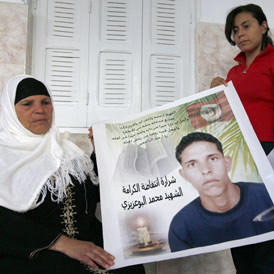Tunisians honour Arab Spring hero who set himself on fire
Crowds of well-wishers mark the first anniversary of a desperate act of self-immolation that lit the flame of revolution across North Africa.

Tens of thousands of Tunisians have gathered in the town where an unemployed man set himself on fire a year ago in a desperate gesture that marked the start of the Arab Spring uprisings.
Unemployed university graduate Mohamed Bouazizi set himself alight after police in Sidi Bouzid confiscated his unlicensed fruit and vegetable cart. He died later in hospital.
His death caused simmering anger about poverty, joblessness, corruption and repression in the North African country to boil over into revolt. Protests erupted across Tunisia, forcing autocratic President Zine Al-Abidine Ben Ali to flee the country less than a month later.
The revolution inspired other Arabs to rise up against authoritarian rule. Regimes were overthrown in Egypt and Libya, while Yemen’s leader has stepped aside for a reformist transition and Syria’s president faces a spreading insurgency.
In Sidi Bouzid, tens of thousands of people rallied in the central square, dancing to the rhythms of popular songs despite cold weather. Flags and photographs of Tunisians killed in the uprising decorated the streets.
The country’s new president and prime minister unveiled a giant status of Bouazizi, who has become a national hero in the North African country.
I ask government officials to pay attention to poor areas and provide jobs for young people. Manoubia Bouazizi
But Manoubia Bouazizi, Mohammed’s mother, conveyed the underlying concerns of many by urging Tunisian authorities to turn the revolution into a better quality of life for the population, especially the young.
She said her son “set himself alight to grant liberty to Tunisia and the Arab world”, adding: “I ask government officials to pay attention to poor areas and provide jobs for young people.”
Moncef Marzouki, made president this week as part of a governing coalition installed after Tunisia’s first democratic vote, paid tribute to Tunisians who defied Ben Ali and in some cases paid with their lives to see through the revolution.
He said: “Sidi Bouzid, which has suffered from marginalisation, restored the dignity of all Tunisians. We have pledged to restore the joy of life to these areas.”
Popular resentment over economic woes has boiled over into rioting in several towns in recent weeks. Protesters set fire to some public buildings and clashed with security forces.
Unemployment, at 13 per cent at the end of 2010, is now at 18.3 per cent, according to central bank figures. The jobless rate among young people is much higher.
Voters in October handed victory to the moderate Islamist Ennahda party. A cabinet line-up is expected to be announced in coming days. The new leaders will hold power for a year while a new constitution is drawn up and fresh elections are prepared.
-
Latest news
-
Year of civil war in Sudan ‘a nightmare of hunger and displacement’4m

-
Israel fears repeat Iran attack, says former editor of Jerusalem Post4m

-
How long could it take to clear the Rwanda asylum seeker backlog?3m

-
Rwanda asylum boost for Sunak as bill expected to become law2m

-
Donald Trump trial: day one of historic Stormy Daniels court case4m

-




